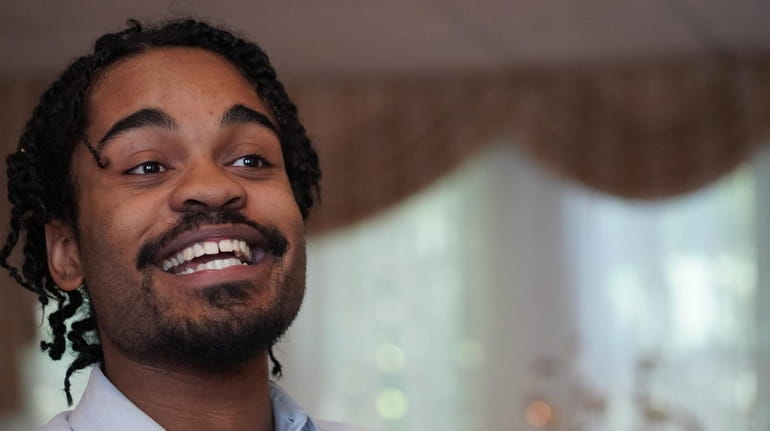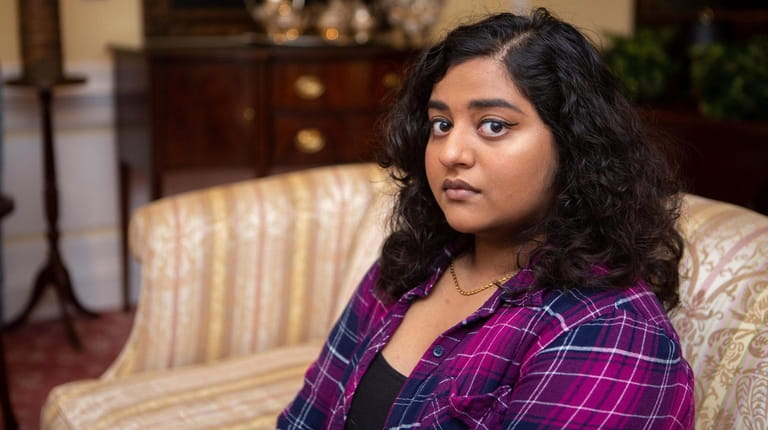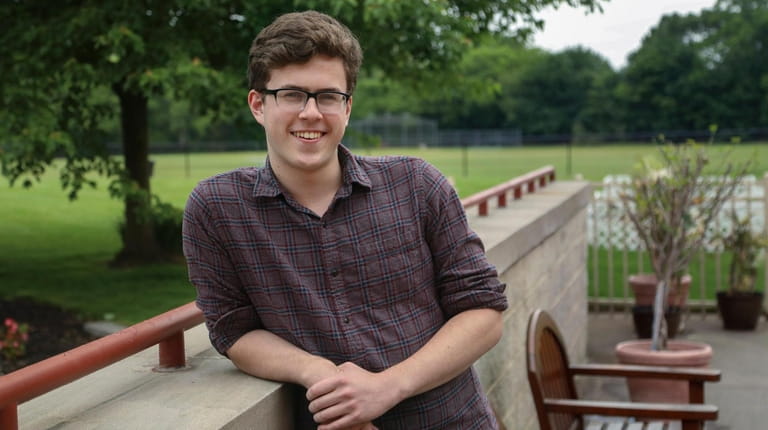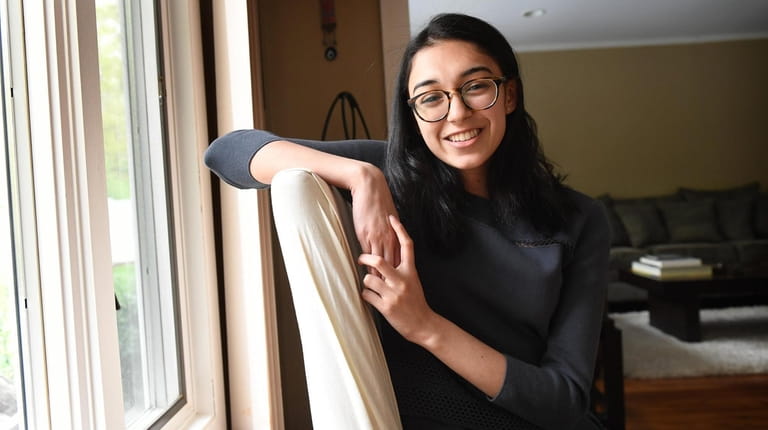How are the Dem candidates feeling? These 4 LI debaters know

Donovan Harvey, a Hofstra University graduate, on May 15. Credit: Debbie Egan-Chin
As 20 Democratic presidential hopefuls face off in primary debates this week with all their rigorous preparation and high pressure, four champion Long Island debaters know exactly how they feel.
“It's almost hard to overstate,” said Donovan Harvey. “Debate is a grueling activity.”
The 19-year-old Hofstra grad has been competing in debates since middle school, and has participated in roughly 200 debate rounds in his life. He’s a world champion, placing first in the International Public Debate Association (or IPDA) event in Germany this March.
His warm-up strategies and rituals are tried and true. In addition to eight hours of sleep, staying hydrated and eating right, Harvey gets ready for a debate by rapping a Drake song in his “speech voice.”
“I'm at a lectern, I'm presenting and just rapping the lyrics as quickly as I can just to get that feeling, get the blood flowing,” he said. “You just need a song where you know all the lyrics by heart and you can just go.”
Recent Syosset High School graduate Diya Chadha, a veteran of national competitions and president of her school’s speech and debate team, has a table in her home full of reusable water bottles. She says they come in handy when she’s spending 10 hours straight competing at a debate tournament.
Her go-to snack is a Kashi dark chocolate mocha granola bar. Chadha doesn’t drink much caffeine, so, “I've got a little bit of subtle coffee in there,” says the 17-year-old.
Chadha and Harvey are among thousands of Long Island students who participate in various debate and related speech events. Harvey calls it a “cognitively exhausting” world, and thinks the candidates on Wednesday and Thursday should approach their opponents as if they’re playing poker.
“You fold, you fold, you fold — you're all in. Boilerplate answer, boilerplate answer, try to structure a little bit. And then when it's a really soft pitch, you try to hit it out of the park.”
Chadha says she’s been paying close attention to the news cycle leading up to the debates, noting how high the stakes are.
“I think a person who leads or has any position of leadership or authority should be able to speak,” she said. “I think it's a skill that is irreplaceable, and really says so much about how you are as a person."

Mary Joseph, a Hofstra University graduate, on May 8. Credit: Shelby Knowles
Chadha, Harvey and other standout student debaters have observed the speaking styles and techniques of the Democratic candidates vying for the presidential nomination. Mary Joseph, 21, who was captain of Hofstra’s speech and debate team before graduating, has some tips for Sen. Kamala Harris, a former Howard University debater herself.
“I saw a clip of her saying something and she thought what she was saying was so great, but she didn't have the impactful delivery of it,” Joseph said.
“It didn't impact me the way it should have. And her tone is a little bit nonchalant and I just wish she was a little bit more forceful and carried her voice out more; emphasis on words.”
Syosset High School rising senior Asher Gladstone, who is headed to a national debate championship tournament at the Ronald Reagan Presidential Library in July, offered advice to his favorite candidate, Sen. Bernie Sanders.
“There were times in the 2016 primary debates where I was like, ‘Bernie, just be angry!’” said Gladstone, 17. “You're allowed to be angry. Just say something: ‘That's a lie, that's a misrepresentation,’ just say something!”
The students also believe that the candidates — and our country overall — could learn broader lessons from high school and college debate.
Real news, real nerves
Imagine a presidential debate in which the candidates listen thoughtfully to each other, don’t talk over one another and respond to arguments with pages of evidence and research they’ve spent hours or days compiling themselves.
That’s what these students do every time they step up to the podium.
“You're forced to think critically about the issues of our society, more so than any sort of political science class will ever teach you,” said Joseph, who graduated this spring from Hofstra with a degree in rhetoric and public advocacy. She explained that in the limited time debaters have, their job is to explain a problem, its cause, and the possible solutions.
And, she added, “You have to be able to package the information in a way that's accessible to everyone.”
Debaters also keep more subtle things in mind while on stage; for example, body language and hand gestures. Gladstone says he learned the importance of that from his father, who also participated in speech and debate in high school.
“The first-ever advice he gave me after a debate tournament was a hand gesture that he claims he developed when he was a debater,” Gladstone said with a laugh. “It was his pointer finger and his middle finger on top of each other and his ring finger and pinky curled back to his palm with his thumb resting on the ring finger and just kind of pointing forward.

Asher Gladstone, a Syosset High School student, at the South Huntington Library on May 30. Credit: Newsday/John Paraskevas
“I think it looks cool when he does it. I have yet to use it in the last three years.”
Chadha says she tends to talk on the faster side, which she attributes to being from New York. She matches her hand movements to her rhythm but other than that, she doesn’t budge.
“My body is still and straight,” Chadha said. “If you waddle a little bit or move your shoulders, or twist your hair, that's an instant sign of, ‘Oh, maybe she's a little bit nervous.’”
Gladstone is familiar with those signs, and says the most important thing he’s learned from debate is even if you’re not confident, “seeming like you're confident — being able to fake it.”
These lessons seep into his everyday life. “It's somewhat embarrassing to say, but it's happened a few times where there has been a bit of an elevated discussion at the dinner table and my mom has told me, ‘This isn't one of your debate rounds, cut it out.’”
Joseph says she used to be terrified, to the point of tears, of public speaking as a child. Now the debater — who recently placed second in the world for prose interpretation — feels powerful on stage.
“I have a problem with hunching my shoulders when I sit,” Joseph said. “But when I stand, I put my shoulders back and I do the Bernie Sanders arms out [to the sides] and talk like that to take as much space as I can.
“Because the more space I take up, the more they see of me.”
Race and gender in the debate round
Joseph and Chadha have both noticed gender double standards in debate — sometimes played out right before their eyes onstage.
“When you see a girl and a guy debate one another, there is an expectation from the girl to be more courteous, less loud and aggressive,” Chadha said. “And when a guy does it, it's OK or it's more accepted from whoever's watching.”
Gladstone can attest to that: “My voice carries in a room and I've never received any comments that I'm being too loud, too aggressive or too forceful. People have only said, ‘You have a lot of energy,’ or ‘I like how enthusiastic you are.’
“But I think there are girls on my team who have done similar things, but they've been called aggressive [by judges].”
Issues like these may play out in the Democratic primary debate. Chadha thinks there is a higher expectation for female candidates, and she has been in fiery debate rounds where she’s had to take a step back and say, “Let’s talk like we’re in a coffee shop and just doing things normally.”
“I think there is this extra line that a female candidate has to cross just because it's unprecedented to have a woman in office like that,” she said. She added that in 2016, when President Trump faced off against former Secretary of State Hillary Clinton, “it kind of seemed like Hillary Clinton had to do this extra job of explaining everything she said really well.

Syosset High School debate student Diya Chadha in her home on May 9. Credit: Newsday/Thomas A. Ferrara
“But I feel like Trump got away with saying a lot more very vague things, and Hillary Clinton did not.”
Harvey, who is African American, says he’s also experienced “uncomfortable racial dynamics” during debates. He said while he competed at a tournament in Pennsylvania as a junior in high school, “you could probably count on two hands the number of African Americans there.”
“Debate replicates a lot of the issues that are in society, just byproducts of that,” he said. Harvey added that in his experience, debate judges have assumed that a team of white students would triumph over a team of black students before a round even starts. But once he starts talking, he’s able to get those conclusions to “slip away pretty quickly.”
“But,” said Harvey, “that initial advantage matters.”
Learning to see both sides
The students believe a debate can be a good predictor of how a candidate would perform as president. “There is no other way for the public to understand the way someone thinks or will lead the country without their communication and their debate,” Chadha said.
Harvey added that there are organic factors that come into play, as well. “Debates are a pretty good approximation for how people respond to uncertain circumstances, whether it's a question you didn't prepare for or a response you didn't anticipate your opponent making, or little things like the room was really hot.”
“I think we are all drawn to a gifted orator being the president and representing American values around the globe. I think that sort of soft power, that soft influence, is showcased through debates. And, selfishly, they’re just fun to watch.”
Although the Democrats are in the spotlight now with primary debates, the students also weighed in on Trump’s performances against Hillary Clinton in 2016. They generally felt his authoritative, confident demeanor and unconventional use of simple language is what ultimately led him to victory, although they questioned the truthfulness of what he said and his lack of policy specifics.
Harvey, who coaches high school debaters, says he takes a page from Trump’s playbook when he advises his students. “As you keep saying something, even if people don't think it's true, it lends it more credibility and [Trump] does that remarkably well. He does speak with an authority.”
“One of the things I tell the people I coach is once you commit to saying something, commit to saying it. You're not backtracking anymore … these are the words, now work with it. Donald Trump doesn’t backtrack — it sounds glib and you poke fun, but it’s to just assert things as true that matters. That is a really important skill to have.”
Aside from what the students thought of Trump the debater, Chadha felt like their training gives them insight into why he was elected.
“[Debate] forces you to really understand that other side of the situation, and the way that people are thinking,” she said. “I understood why people voted the way they did and what they saw in him.
“I think if I didn't have a background in debate, I probably would've just been like, ‘I cannot understand it at all.’ I think that ability to see both sides has made me a lot more open minded.”
Let's debate
In all debate events, students are timed and judged based on their performance and their ability to respond to their opponent. The judges score them and write down their critiques, which the competitors receive after the debate tournament. There are a number of competitive speech and debate events that students can participate in, such as:
- Extemporaneous: Students have a half-hour to prepare a seven-minute speech on a topic, for example, a midway point look at Trump’s presidency.
- Public forum: Students argue both sides of a proposition, such as “The United Nations should grant India permanent membership on the Security Council.” (This topic was used in the most recent New York State Grand Championship Tournament.)
- Lincoln-Douglas: Named after the famous debates over slavery that Abraham Lincoln and Stephen A. Douglas engaged in during the 1858 Illinois state election campaign, students debate both sides of a value or resolution. For example, “the illegal use of drugs ought to be treated as a matter of public health, not of criminal justice.” (Also used in the recent state championship tournament.)
Gilgo-related search continues ... Huntington subdivision lawsuit ... LI home sales ... Vintage office equipment
Gilgo-related search continues ... Huntington subdivision lawsuit ... LI home sales ... Vintage office equipment

